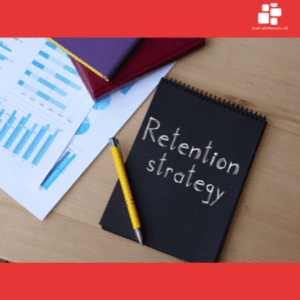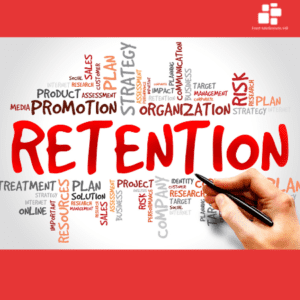
You know the cost of recruiting a new member of staff to your business, the uncertainty of the candidate actually turning up on their start date or leaving within the first few months. The productivity dip whilst a new employee is learning the new role, additional workloads your existing staff do whilst you recruit all strengthens the case for an employee retention strategy. Taking time to develop a strategic approach to retaining your existing employees has never been so important. With 1 in 2 recruiters (53%) stating retention is a key issue in the industrial sector (Source: REC, Nov ’21 report) it really is time to get your retention strategy right.
In this post we’ll be looking at:

Before you start to put in place retention plans, get your measurements in place by deciding the time period. A 12-month period works well, reviewed quarterly so you can see the amount of knowledge and skills retained, or not, within your business. Use this as part of your HR Metrics in place to review and take appropriate action.
Remaining Headcount ÷ Starting Headcount x 100
31 (employees at the end of the time period) ÷ 36 (employees at the start of the time period) x 100 = 86.1%
You do not include any new hires as the measurement shows you the % of employees retained during the full time-period. You may also want to consider the industry standard to monitor your business against others in your sector.
You’ve got your calculation, and you want to make sure you keep the knowledge and skills that you’ve paid time and energy into developing stay with your business. Investing in retention gives you the opportunity to build on the skills of your team and ensure productivity is high, and reduces time and productivity of new hires learning the job. Get your retention strategy in place:
A great way to do this is with Engagement Surveys, Focus Groups, 121 programmes, Stay Interviews. As long as you are providing the opportunity for employees to feedback to you about the culture at work, and you address the issues you are on the starting block.
Getting your recruitment practices right has never been so important, with the difficulty in finding new hires and cost implications, you must make sure your new employees know what the expectations of the role are, what their contribution is to the business and how you will develop their skills.
Review your base salaries, holiday, pension scheme, maternity & paternity. Consider Wellness programmes, individual development, health care plans, and learning opportunities. Check in with employees to see if what you are offering matches what employees want. An employee recognition scheme is a great initiative to link exceptional performance to your core values and reward employees with a non-monetary gift.
Not all companies may be able to provide flexible or hybrid opportunities, but take an opportunity to identify what, if anything, can be different, a 9-day fortnight maybe? Train line managers to support hybrid working employees, focus on outputs and results rather than micro-management.
Absolutely, according to LinkedIn’s 2022 Workplace Learning Report, having opportunities to learn and grow is now the top driver of great workplace culture. As a small business, you may not be able to offer career progression, but you can develop skills and provide meaningful work that shows the benefit they bring to your business. Invest in your line managers who can support their team to grow, support continuous improvement, productivity improvements, and build your business. Use your data to support workforce planning to ensure you have the skills needed for the future of your business.
workplace culture. As a small business, you may not be able to offer career progression, but you can develop skills and provide meaningful work that shows the benefit they bring to your business. Invest in your line managers who can support their team to grow, support continuous improvement, productivity improvements, and build your business. Use your data to support workforce planning to ensure you have the skills needed for the future of your business.
In this article we’ve shown you how to measure employee retention and given you ideas to consider when putting your strategy together. Whilst reducing training budgets may be thought of as a way of saving money, use this to keep your employees upskilled and reduce recruitment spend.
Let’s chat retention strategy, with a complimentary initial consultation, contact Nicky Buckley, Managing Director, East Midlands HR:
07973 353 498
East Midlands HR Limited is a company registered in England and Wales with company number 12030304. VAT registration number is: GB 337 82 52 82
E&OE
Need urgent HR advice - phone 01604 406443